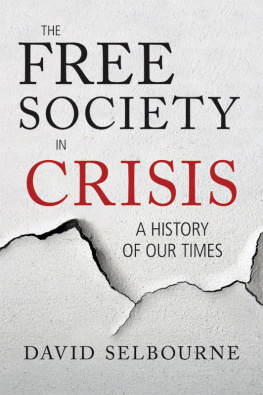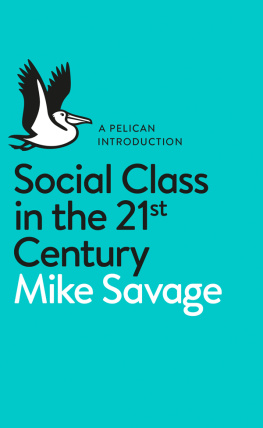THE INVISIBLE CRISIS OF
CONTEMPORARY SOCIETY
Advancing the Sociological Imagination
A Series from Paradigm Publishers
Edited by Bernard Phillips and J. David Knottnerus
Goffman Unbound! A New Paradigm for Social Science
By Thomas J. Scheff (2006)
The Invisible Crisis of Contemporary Society: Reconstructing Sociologys Fundamental Assumptions
By Bernard Phillips and Louis C. Johnston (2007)
Understanding Terrorism: Building on the Sociological Imagination
Edited by Bernard Phillips (2007)
Struggles before Brown: Early Civil Rights Protests and Their Significance Today
By Jean Van Delinder (2008)
Postmodern Cowboy: C. Wright Mills and a New 21st Century Sociology
By Keith Kerr (2008)
The Treadmill of Production: Injustice and Unsustainability in the Global Economy
By Kenneth A. Gould, David N. Pellow, and Allan Schnaiberg (2008)
Forthcoming
Ritual as a Missing Link within Sociology: Structural Ritualization Theory and Research
By J. David Knottnerus (2009)
THE INVISIBLE CRISIS OF
CONTEMPORARY SOCIETY
RECONSTRUCTING SOCIOLOGYS
FUNDAMENTAL ASSUMPTIONS
Bernard Phillips, Louis C. Johnston
First published 2007 by Paradigm Publishers
Published 2016 by Routledge
2 Park Square, Milton Park, Abingdon, Oxon OX14 4RN
711 Third Avenue, New York, NY 10017, USA
Routledge is an imprint of the Taylor & Francis Group, an informa business
Copyright 2007, Taylor & Francis.
All rights reserved. No part of this book may be reprinted or reproduced or utilised in any form or by any electronic, mechanical, or other means, now known or hereafter invented, including photocopying and recording, or in any information storage or retrieval system, without permission in writing from the publishers.
Notice:
Product or corporate names may be trademarks or registered trademarks, and are used only for identification and explanation without intent to infringe.
Library of Congress Cataloging-in-Publication Data
Phillips, Bernard S.
The invisible crisis of contemporary society : reconstructing sociologys fundamental assumptions / Bernard Phillips and Louis C. Johnston.
p. cm.
ISBN-13: 978-1-59451-371-8 (hc)
ISBN-13: 978-1-59451-372-5 (pbk)
1. Social problems. 2. Applied sociology. 3. Sociology. I. Johnston, Louis C. II. Title.
HN29.5.P47 2007
301.01dc22
2006037208
Designed and Typeset by Straight Creek Bookmakers.
ISBN 13: 978-1-59451-371-8 (hbk)
ISBN 13: 978-1-59451-372-5 (pbk)
To David Christner
for his long-term and enthusiastic commitment
Contents
THE SIGNIFICANCE OF THE FOLLOWING PAGES is yet to be assessed. Will it communicate effectively to contemporary sociologists and their students? To other social scientists? To a broader reading public? Will it succeed in opening the door to a rethinking of the metaphysical and epistemological assumptions prevalent throughout the social sciences as well as contemporary society? Will it help to usher in the development of alternative paradigmatic assumptions which promise to help resolve basic contradictions between present ideals and practices within the academic world and beyond? More concretely, will it help academicians and others to develop a scientific method which follows scientific ideals and, as a consequence, penetrates deeply into the complexity of human behavior and into urgent social problems? Will we social scientists learn how to use that broad scientific method in our everyday lives? And can we succeed in demonstrating to others how knowledge can be put to work to solve problems, and how such partial solutions can in turn yield greater understanding?
Our grandiose aims for this book are implied by the above questions. We earnestly believe that the times call for such optimism about the possibilities of the social sciences, given the threatening problems facing the human race in our new century. Yet at the same time we are aware of the incredible difficulties involved in developing the changes called for by positive responses to those questions. However, despite current highly threatening events, and despite a prevailing pessimism throughout the social sciences, we have never lost our commitment to the Enlightenment dream of societies based on reason and, we would add, a scientific method that promises to continually and rapidly extend our understanding of human behavior without any limit. We hope that this book will succeed in helping to open the door to the development of such a method along with the metaphysical stance or worldview that will make this possible.
We would like to thank David Christner, to whom this book is dedicated, for his continuing and enthusiastic encouragement and insights during the development of this manuscript. As an early participant within the Sociological Imagination Groupdescribed in the Introductionhe joins us in our optimism about the possibilities of the social sciences. We also wish to thank Harold Kincaid for his close reading and many suggestions that have yielded numerous additions to the manuscript. Much the same is true for David Knottneruss reading of the entire manuscript and his many insights. Thomas J. Scheff has also contributed most substantially, both through his development of a methodology which has become a key portion of our own approach to the scientific method as well as through his reading of parts of the manuscript. And we are most grateful to Dean Birkenkamp, president of Paradigm Publishers, for his continuing support for our efforts along with important suggestions. In addition, we extend our thanks to other individuals who identify with the Sociological Imagination Group and who have been most encouraging: Hans Bakker, Stephen Baran, Martha DeWitt, Kevin Fox Gotham, Paul D. Johnson, Alan Kahn, John Livingstone, Michael Lynch, John Malarkey, Neil McLaughlin, Adam Rafalovich, Suzanne Retzinger, Hilarie Roseman, Sandro Segr, Robert Stebbins, Emek Tanay, Jonathan Turner, Jean Van Delinder, and Todd Powell-Williams.
Finally, our long list of references indicates individuals and their work who formed the backbone of this book. That list includes Marx on alienation, Durkheims Suicide, Mills White Collar and The Sociological Imagination, Kuhns Structure of Scientific Revolutions, Gouldners Coming Crisis of Western Sociology, Kincaids Philosophical Foundations of the Social Sciences and Scheffs Emotions, the Social Bond, and Human Reality: Part/Whole Analysis.
Bernard Phillips and Louis C. Johnston
Upon this gifted age, in its dark hour
Rains from the sky, a meteoric shower
Of facts
They lie unquestioned, uncombined.
Wisdom enough to leech us of our ill
Is daily spun, but there exists no loom
To weave into fabric.
Edna St. Vincent Millay
Al Qaedas assault on the American people on September 11, 2001, accompanied by increasing concerns over the deadly nature of nuclear, chemical and biological weapons of mass destruction, has dramatically increased a sense of insecurity and fear for the future throughout the world. Martin Rees, Englands Astronomer Royal and a professor at Cambridge University, has examined such problems in












